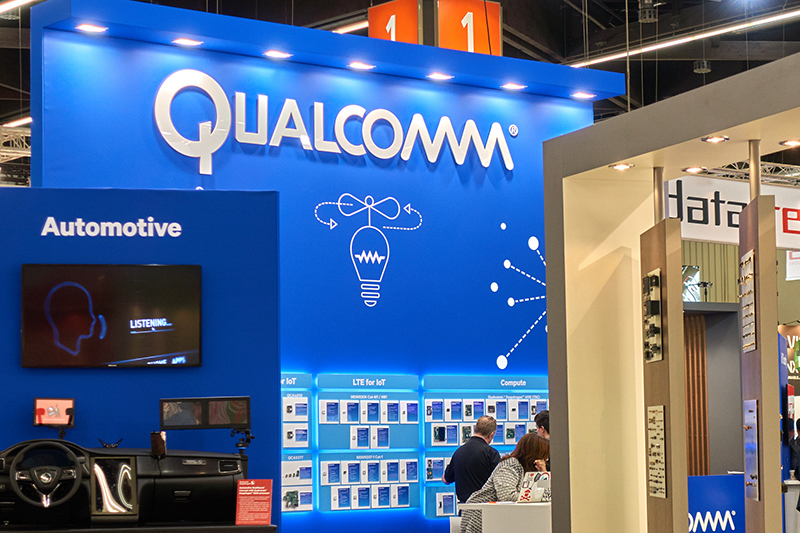 INFRA
INFRA
 INFRA
INFRA
 INFRA
INFRA
Shares of mobile chip maker Qualcomm Technologies Inc. began to rebound today thanks to a better-than-expected fourth-quarter earnings report.
The positive reaction from investors came despite looming concerns about the company’s ongoing legal battle with Apple Inc, which accuses Qualcomm of charging excessive royalty fees.
Qualcomm came out ahead of Wall Street expectations today, posting earnings of 92 cents versus the 81 cents expect by analysts, and revenue of $5.96 billion versus the expected $5.8 billion. The company’s shares dropped sharply earlier this week after reports suggested that Apple could drop its relationship with the company entirely, but they bounced back earlier today and continued rising by as much as 2 percent in after-hours trading following its earnings report before settling back to a 1 percent uptick.
During today’s earnings call with investors, Qualcomm Chief Executive Steve Mollenkopf highlighted the company’s success with 5G mobile networks as a vital component of the company’s earnings this quarter. Mollenkopf also pointed to better-than-expected growth in several key areas, including automotive, “internet of things” and security, and he said that this marks the sixth consecutive quarter of year-on-year growth for Qualcomm’s strategic objectives. Qualcomm says that it has also made significant progress in its market share in China, as well as in developing markets such as India.
“Qualcomm had a good Q4 when you factor in the nonpayment of intellectual property royalties by Apple subcontractors,” Patrick Moorhead, president and principal analyst with Moor Insights & Strategy, told SiliconANGLE. Moorhead also said the future looks better because of the significant lead Qualcomm has in chips for 5G, the next step up for mobile networks.
“Qualcomm holds a 12- to 24-month time advantage on mobile 5G,” he said. “This matters as in 4G, it will be hard for any manufacturers to not work with Qualcomm if they want to have 5G phones early on. We expect 5G smartphones to arrive in two countries in the end of 2018 followed by pervasiveness in premium Android devices in the second half of 2019.”
Still, the company’s profitability has seen a major drop in the last year thanks to lower license revenues, which show up in its QTL segment, in the wake of the Apple legal battle. Qualcomm’s net income was $168 million, down 90 percent from $1.6 billion a year ago. Although Apple’s $1 billion lawsuit against Qualcomm is likely weighing heavily on the minds of the company’s investors, Mollenkopf only briefly mentioned the suit.
“In QTL the second half of fiscal 2017 results were impacted by disputes with Apple and its contract manufacturers, as well as one other licensee, and we remain focused on defending our business and the value of our patented inventions for the long term,” said Mollenkopf. Investors pressed for more information during the Q&A portion of the earnings call, but Qualcomm’s executives remained evasive, saying only that they were confident in their position in the lawsuit.
Apple’s lawsuit came just weeks after the U.S. Federal Trade Commission filed its own suit against Qualcomm for allegedly strong-arming smartphone makers into unfair licensing deals. The FTC accused Qualcomm of using its patents to block companies from using chips from competitors, which the regulator said is effectively “a tax that excludes these competitors and harms competition.”
Qualcomm has not taken Apple’s lawsuit lightly, and the company has fired back at the iPhone maker with several patent infringement claims. Qualcomm has even attempted to get Apple’s imports banned in the U.S., and it recently tried to get iPhones banned from China entirely.
Apple and the U.S. FTC are also not Qualcomm’s only concerns. The company is also dealing with regulatory problems in Taiwan, which hit Qualcomm with a $744 million fine in October for allegedly violating antitrust laws.
“In Taiwan, we strongly disagree with the recently announced decision and have significant objections concerning the lack of due process that led to the decision,” said Mollenkopf. “We will appeal and seek to stay the decision.” Mollenkopf also noted that the ruling was not made with a full consensus, and he said that Qualcomm was “pleased to see the Taiwanese Ministry of Economic affairs publicly question the [Taiwan Fair Trade Commission] process and decision.”
THANK YOU